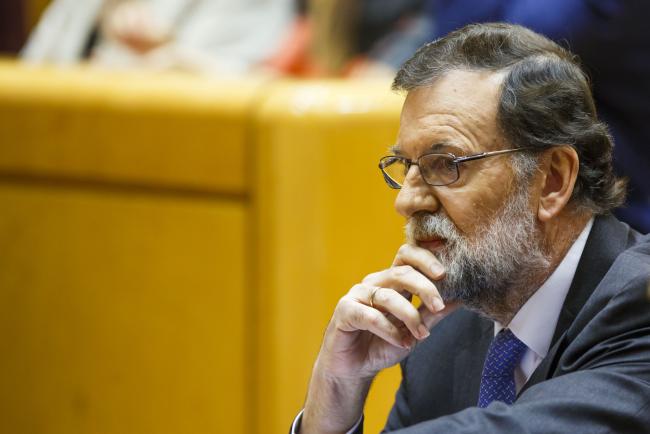(Bloomberg) -- In the final days of Spain’s complex political chess match with Catalan separatism, Prime Minister Mariano Rajoy made the best tactical moves. The longer game of keeping the country’s economic powerhouse in Spain may prove harder to win.
Rajoy lined up backing from the opposition Socialists for his plan to sweep out the Catalan government while his diplomats ensured the European Union supported his stance all the way. The concurrent dismissal of the Catalan government and the announcement of elections in the region for Dec. 21 disoriented the independence movement and reasserted Spain’s authority.
After the early missteps in his Catalan strategy when a clumsy deployment of riot police to hinder an illegal independence referendum produced violence and sparked outrage around the world, Rajoy staged a comeback in recent days by peacefully removing the government of President Carles Puigdemont, who has decamped to Brussels to try to run the secession campaign in exile. For all that, however, the challenge for Rajoy and his successors will be to deal with deep divisions within Catalonia that may take decades to heal.
“This will have huge consequences for the political life of Spain and particularly Catalonia,” said Ken Dubin, a political scientist at ISDE law school and IE business school in Madrid. “Its effects could last a generation.”
The halting of Catalonia’s independence movement, even if temporarily, also poses some thorny questions for the EU, which papered over reservations among some of the region’s leaders at Rajoy’s refusal to enter into dialogue with the separatists. In doing so, the bloc managed to anger democracy activists and has ended up with the embarrassing spectacle of a political exile from one of its core member states fleeing to Brussels.
‘Hearts and Minds’
On the domestic front, the Catalan crisis may have strengthened Rajoy’s political position by shoring up support for the alliance that keeps him in power. An opinion poll published by El Mundo newspaper showed support for his People’s Party rising to 31.4 percent from 30.8 percent in September while backing for his partners in Ciudadanos surged to 16.7 percent from 12.7 percent.
That said, his policies have managed at best to contain the Catalan issue. They have not addressed the root causes of separatist anger, said Joe Haslam, a professor at Instituto de Empresa business school in Madrid.
“He didn’t conquer any hearts and minds,” Haslam said.
Catalonia’s crisis peaked on Oct. 27 when the regional parliament voted for independence in defiance of the Spanish government. Rajoy responded within hours by dissolving the Catalan parliament, placing its administration under his deputy Soraya Saenz de Santamaria and calling elections for the region.
‘Clever Move’
By giving Catalans the chance to elect a new government so soon, Rajoy was able to deflect accusations that his use of a constitutional clause to sweep out Puigdemont’s administration went too far, said Lluis Orriols, a political scientist at Carlos III University in Madrid. Puigdemont’s PdeCAT party and its main secessionist partner ERC both said they would contest the elections, effectively accepting Spain’s authority even as they now claim to see Rajoy as the leader of a foreign power.
“The truth is that the independence parties have to take part in these elections to maintain their impetus,” said Orriols. “That was a clever move by Rajoy.”
Rajoy managed to persuade the Socialists, who make up the second-biggest force in the Spanish parliament, to back his stance on Catalonia even in the face of deep distrust caused by numerous corruption scandals tainting his People’s Party. In a concession to the Socialists, the government backed down on plans to take over Catalonia’s publicly-funded broadcaster TV3.
In another sign that Rajoy was willing to act pragmatically, with a softer touch, his shake-up of the regional police respected the chain of command by installing the force’s number two as its new leader. Josep Lluis Trapero, the police chief who was fired for being complicit in the push for independence, gave his replacement, Ferran Lopez, his backing in a valedictory letter to his officers.
Real Results
At the same time, Spain’s diplomatic corps made sure the EU held steadfast in rejecting the right of the new Catalan republic to resist. EU leaders from Germany’s Angela Merkel to France’s Emmanuel Macron repeatedly voiced support for Spain’s stance over Catalonia and on Friday Donald Tusk, the European Council president, said the EU would pay no attention to the Catalan vote.
“Rajoy did two things well,” said Haslam. “He kept the EU on board and got Socialist backing for Article 155.”
A day after the independence declaration, the new republic melted in the Catalan sunshine as Puigdemont lunched in his hometown of Girona and the crowds of activists sworn to protect it failed to materialize.
On Monday, the Catalan police force was ensuring local officials couldn’t return to their government desks and Puigdemont had fled to Brussels. On Tuesday, he gave a news conference from the Belgian capital to present himself as a leader in exile fleeing what he termed vengeful Spanish justice and making Catalonia’s independence case to a European audience.
Spanish stocks and bonds jumped on signs that normality is returning to a region that contributes a fifth of economic output. Even so, it may be too early to say who is the victor, said Kandarp Mehta, a senior lecturer in entrepreneurship and negotiating tactics at IESE business school.
“Only the future will tell us if the strategy has been successful or not,” said Mehta. “The real results often only become apparent after a very long time.”
(Updates with Puigdemont’s move to Brussels starting in third paragraph.)
